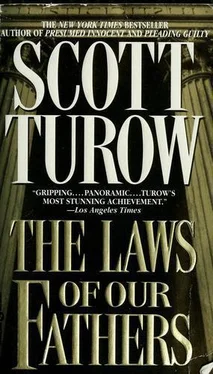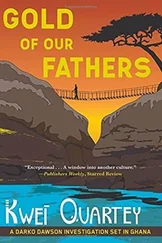Scott Turow - The Laws of our Fathers
Здесь есть возможность читать онлайн «Scott Turow - The Laws of our Fathers» весь текст электронной книги совершенно бесплатно (целиком полную версию без сокращений). В некоторых случаях можно слушать аудио, скачать через торрент в формате fb2 и присутствует краткое содержание. Жанр: Криминальный детектив, на английском языке. Описание произведения, (предисловие) а так же отзывы посетителей доступны на портале библиотеки ЛибКат.
- Название:The Laws of our Fathers
- Автор:
- Жанр:
- Год:неизвестен
- ISBN:нет данных
- Рейтинг книги:5 / 5. Голосов: 1
-
Избранное:Добавить в избранное
- Отзывы:
-
Ваша оценка:
- 100
- 1
- 2
- 3
- 4
- 5
The Laws of our Fathers: краткое содержание, описание и аннотация
Предлагаем к чтению аннотацию, описание, краткое содержание или предисловие (зависит от того, что написал сам автор книги «The Laws of our Fathers»). Если вы не нашли необходимую информацию о книге — напишите в комментариях, мы постараемся отыскать её.
The Laws of our Fathers — читать онлайн бесплатно полную книгу (весь текст) целиком
Ниже представлен текст книги, разбитый по страницам. Система сохранения места последней прочитанной страницы, позволяет с удобством читать онлайн бесплатно книгу «The Laws of our Fathers», без необходимости каждый раз заново искать на чём Вы остановились. Поставьте закладку, и сможете в любой момент перейти на страницу, на которой закончили чтение.
Интервал:
Закладка:
'Hey, Judge,' he says when he arrives before the bench. A bit too familiar.
'Do you swear to tell the truth?' I answer.
Fred's testified here before. Given the cultural limitations of police testimony – every defendant has received his Miranda rights, even though few do these days; every cop has seen whatever his partner has observed – Fred strikes me as more or less a truth-teller, less freewheeling than some others. As he takes the stand, I notice he has his reports rolled up in one hand.
Tommy waits for Lubitsch to settle himself, then Molto positions himself right before the bench. He goes for dramatic effect. A single question. Not even state your name. He lifts a reddened, nail-bitten hand.
'Officer Lubitsch, on September 12, 1995, or any other date, did you use a polygraph machine on Lovinia Campbell, either at Kindle County General Hospital or elsewhere?'
'No, sir,' he says.
Tommy heads back to the prosecution table. 'Excuse the witness,' he says over his shoulder.
I smile at the gambit. This is, in all phases, a game which two must play.
'Mr Turtle, do you want to cross?'
Hobie sits in his chair for quite some time, studying Lubitsch. His lips are rolled into his mouth, virtually lost in the grey-shot muff of beard. He's stumped. For the first time since these proceedings began, he does not rise to address a witness.
'Ms Campbell testified she had a polygraph. Did you know that, Officer?'
'I heard that.'
'And she's lying?'
'She isn't right, I know that much.'
'She's lying?'
'Objection,' says Tommy from his seat. He's fussing with his pad, but he reels off a number of valid exceptions to Hobie's question. Asked and answered. Calls for an improper opinion. Hobie stares at Lubitsch.
'Are you saying, Officer, maybe the witness made a mistake?'
'It might be.'
'She misperceived something?' 'Maybe.'
The courtroom is still. Hobie finally stands, taking the time to secure the front flap of his double-breasted suit jacket, a chalk stripe of soft grey wool.
'Did she think she was getting a polygraph?' Molto objects to Lubitsch testifying to Lovinia's thoughts. Hobie rephrases: 'Did someone tell her they were going to give her a polygraph?'
'Yes, sir, that coulda happened.'
'And who was "they"? Who told her she was going on the box?'
Lubitsch wiggles a bit in his swivel chair. ‘I believe I did.'
‘I see. But you didn't actually do it?'
'No.'
'But she changed her story anyway? I mean, that's what happened, right? This girl was tellin you one thing when you got there and something else when you left?'
'Sometimes with these people -' Fred stops. 'With an offender sometimes -' He wipes his mouth with both fingers. 'An experienced officer, sometimes I think I know pretty well when someone's giving me a line.'
'Yes?'
'We don't always want to take them down to the Hall for the box.'
'The lie box?'
'Right. Here we couldn't. She's laying there with tubes coming out of everywhere.'
'So what did you do, Officer?'
'We tell them we're giving them a box, only we don't' 'You created that impression?' 'That's it.'
'And how did you do that?' 'We put something on her head.' 'What?'
'Something we borrowed from one of the nurses.' 'What?'
'That strap-like, you know, for the heart test?'
'EKG?' 'Right.'
'And you put that around her head? So you could test what she was thinking?'
Lubitsch doesn't answer. His eyes roll up to Hobie and fix him with a dark look meant for the street.
'And was it just the pressure strap? Was that the entire apparatus?'
'No. It had a piece of telephone cord attached.' 'Attached to what?' 'The thing on her head.' 'And what else?'
'A machine.' Lubitsch looks hard at Hobie. Obviously there's no point. 'A copying machine.' 'A photocopying machine?' 'Right. We borrowed that from the nurses, too.' 'Then what did you do?' 'Asked a question.' 'And?'
Lubitsch shrugs. 'Then we pressed a button on the machine.' 'For what?' 'The answer.'
'You get the answer from the machine?'
'That's what we say.'
'Is that what you said to Bug?'
'Right.'
Hobie doesn't speak. Instead, he simply beckons for more with the back of his hand.
'See, we put a piece of paper in the machine before we start. Okay? Then when we press the button, it comes out and we show it to her. Okay?'
'And what was written on the piece of paper?'
' "She's lying." ' There is laughter, of course, a rippling chorus loudest from the jury box.
'So you had this young woman sitting there with a rubber strap on her head and a piece of telephone wire that was attached to a Xerox machine, and then you pressed a button and it produced a piece of paper that said she's lying and you showed that to her, right?' 'Right.'
'And she believed it?' 'Because she was lying.'
Hobie looks to me, without even bothering to voice the objection. I strike Lubitsch's last answer and Hobie expels a magnificent sigh of disgust as he walks back to the defense table, winding his head. Cops.
'Are we done?' I ask.
Hobie argues vociferously that Lovinia's testimony has to be suppressed. He calls the police 'deceptive' and 'exploitative,' as if the Supreme Court hadn't long ago decided to tolerate such conduct in the name of effective law enforcement. When Molto comes to the podium to respond, I greet Tommy with a dour look. He was running changes on me this morning. One of the iron rules of my courtroom, especially for the prosecutors, is that you pay the price when you mess with the judge. The P As will run you over if you let them, and as a woman, I feel the need to be particularly firm. I'm frosty enough with Tommy to scare him. But I deny the motion in the end. No right of Nile's was violated by what the police did to Lovinia. Bug, especially as a juvenile, would have a pretty strong argument that the statements she made to Lubitsch and Wells can't be used against her. In fact, now that I think about it, I see how Hobie persuaded Bug – and her lawyer – that she could ignore Molto's threats to throw out Bug's deal if she came off her prior statements. Given this monkey business, there's no way Tommy could risk reprosecution, since Bug might walk completely. Hobie, the pro, does not miss a beat when I rule.
'In the alternative, Your Honor,' he says, 'I'd like to make the officer's testimony part of my case. So I don't have to recall him.' Relieved, Molto ventures no objection, but says in that case he'd like to ask a few more questions of his own. He stands at the prosecution table.
'Officer Lubitsch, after Ms Campbell admitted she was lying -'
'Objection. He told her she was lying.'
'Rephrase the question.'
'After this mock-polygraph,' says Tommy, 'Ms Campbell made a statement, correct? And is it fully set forth in your report?'
Lubitsch testifies that each of his reports is an accurate rendition of what Lovinia said.
'And returning to September 12 in the hospital, did you ever tell Ms Campbell what Hardcore had previously told the police?'
‘I didn't know what Hardcore had said. It wasn't my case. Montague asked me to talk to Bug because I knew her. That's all. She told me a story, we did our lie-box thing, and she made her statement.'
'You didn't tell her what Hardcore said?'
'Nope. That's not my s.o.p.'
Tommy nods. He's just made up a great deal of ground. Sorting through it all, the critical issue in evaluating Bug's testimony is whether what she said to the cops in the first place was true. I could believe she told them what they wanted to hear, not so much because she seems easily cowed – even at fifteen she isn't – but because she's clever enough to deal that way. But if Bug didn't know what Core had said, there' s only one way, realistically, her sworn statements to Lubitsch could match Hardcore's version of events: because that's what happened out on the street. At least, that's the way I add it up. Tommy does, too. He's gone back to his seat with an unbecoming little swagger, enjoying the fact that he's finally put Hobie in his place.
Читать дальшеИнтервал:
Закладка:
Похожие книги на «The Laws of our Fathers»
Представляем Вашему вниманию похожие книги на «The Laws of our Fathers» списком для выбора. Мы отобрали схожую по названию и смыслу литературу в надежде предоставить читателям больше вариантов отыскать новые, интересные, ещё непрочитанные произведения.
Обсуждение, отзывы о книге «The Laws of our Fathers» и просто собственные мнения читателей. Оставьте ваши комментарии, напишите, что Вы думаете о произведении, его смысле или главных героях. Укажите что конкретно понравилось, а что нет, и почему Вы так считаете.












